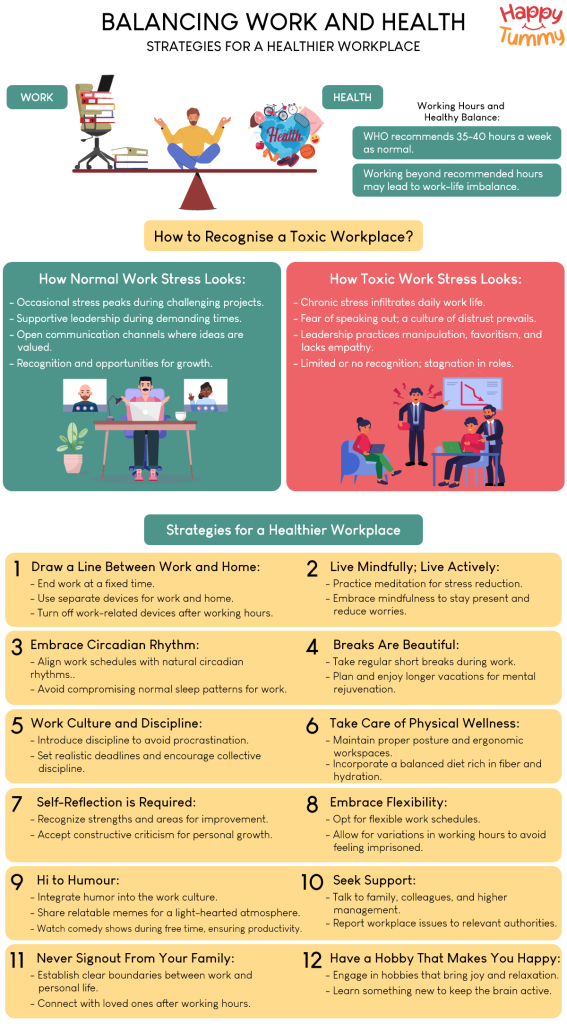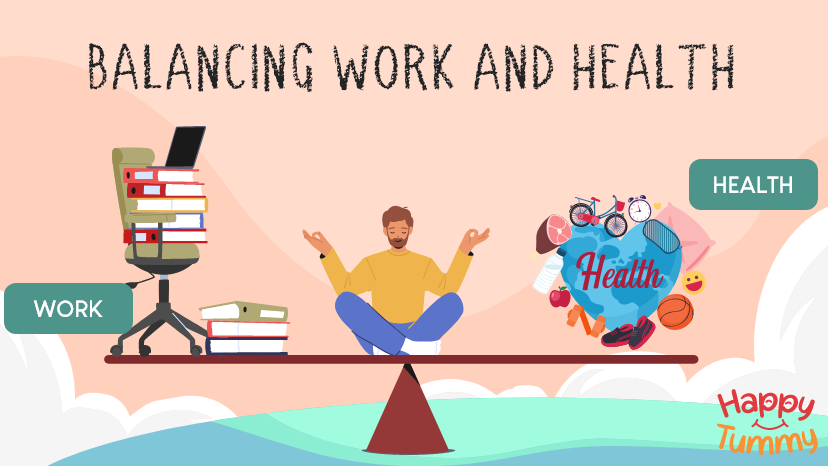Table of Contents
Whenever the word ‘office’ comes to our minds, we think of stress. It has become a norm. Deadlines, presentations, toxic competition, and the loud criticisms of higher management. Dealing with all this withers our very human nature and we carry this stress to our homes, our beloveds, and ruin everything else. The most unhealthiest thing.
One study done in over 35 countries including India revealed that 67% of employees facing work stress fell into depression. [1]
Work and life balance, although is a luxury, should be aimed for by each one of us. Failing to deal with it can have fatal effects not just on us but also on those connected to us—our family members.
So, let’s come out of cubicles and see how toxic workplaces impact our health and relationships, working strategies to deal with it, and how to promote a healthy work culture.
Difference between a toxic workplace and normal work stress
Usually, there remains a fairly thin line between normal work stress and a toxic workplace. When working in the office, it is quite common to face a bit of stress. Novel workplace responsibilities create a sense of pressure and we feel a bit burdened.
Having clarity if you actually are working in a toxic environment is vital to dealing with it. Here are a few points to spotlight the differences:
| Aspect | Normal Work Stress | Toxic Workplace |
| Intensity and Pervasiveness | Occasional stress peaks during challenging projects. | Chronic stress creeps into daily work life and derails both individual and collective well-being. |
| Leadership Impact | Higher management is supportive and holds your back during demanding times. | Leadership practices manipulation, favouritism, and lack of empathy. This breeds distrust and depresses employees. |
| Communication Channels | In a good place, we can talk freely, and bosses listen to our ideas. | We can’t say what we think. Everyone is scared of getting into trouble. |
| Recognition and Growth | We learn new things. Also, the management notices and awards when we do well. | Here, nobody cares about what we do. We’re stuck doing the same things over and over |
| Team Dynamics | The team is fantastic. We work together and help each other. There is also healthy competition and collaboration within teams. | Here, everyone is mean to each other. It feels like a competition all the time. |
| Work-Life Balance | Sometimes we work extra. Just sometimes. | Here, companies always want us to work, even on festivals. We never get a break. |
| Employee Well-being | They help us with our problems and even have workshops on feeling better. | No one cares what we feel or go through. We are always stressed and tired. |
If work feels tough once in a while, that’s normal. But when it feels tough all the time and makes you unhappy, that’s a sign something might be wrong.

How many working hours are healthy?
Chronic workplace stress always proves fatal in the long term. It impacts each aspect of our lives. Working for more hours than is considered healthy can lead to work-life imbalance.
Japan’s Karoshi, which means ‘work to death’, is a present social issue where employees die suddenly due to death
So, how many working hours are healthy?
WHO considers 35-40 hours a week to be normal. People working more than this are at higher risk. [2]
What can put you at higher risk of work-life imbalance?
- If you are a student looking to manage finances while taking care of academics as well.
- If you have bills valued higher than you are earning.
- A family person who has to manage time to take care of both office and family-related responsibilities
All these are very reasonable reasons to dump your life’s balance off the track but the impact is brutal.
The impact of chronic work stress on health and relationships
Let’s see how toxic workplaces can mess with our health, and relationships, and make life harder:
- Falling physical health: Increased work stress and toxicity can easily lead to more physical ailments. Everything from immunity to heart health, brain health, and digestion gets impacted. [3]
- Ruined mental health: Excess mental stress can lead to burnout, depression, anxiety, and failure to cope with normal emotions at last. [4]
- Increased marital disagreements: Inability to manage higher office work and family can easily lead to more fights and disagreements. It has led to an increased rate of divorces. [5]
- Decreased productivity: Working over the clock decreases work productivity significantly. [6]
- More sick leaves: Workplace burnout also increased the amount of sick leaves by as much as 4 times. [7]
- Sleep deprivation: Increased work stress means sleep deprivation and poor sleep quality. And sleep deprivation, again, leads to depression and physical sickness. [8]
It is a vicious circle. And the thing is, you won’t be able to notice many of these changes when they are taking place in your lives.
So, it is always better to observe the small hints and make changes proactively. Let’s see how to bring work-life balance and make our lives a joyful happening rather than a toxic one.
Strategies for a Healthy Work-Life Balance
1. Draw a Line Between Work and Office
Most of us tend to bring office into our homes. Its chances rise higher in cases where people work from home. We can easily forget when the clock is up and take up responsibilities when it is family time.
Here are a few ways to deal with this mixup-
- End work at a fixed time
- Keep different sims and devices for work and home
- Turn off official devices after your working hours are over
2. Say Yes to Circadian Rhythm
The rising globalization has pushed employees from numerous countries to work over the clock according to the schedules of different countries. India is especially among the countries where most people work overnight as per UK, US, or Australian schedules by compromising their sleep patterns. We’ll tell you why is it ruining your health.
Human bodies have a natural clock that evolved over millions of years and works around sunrise and sunset. It releases certain hormones like cortisol, melatonin, lepin etc., activates certain functions, makes us wake up and sleep, and alters our mood.
Derailed circadian rhythm can easily lead to mood disorders and depression over a long period. [9]
If possible, try to do a job that allows you to sleep and wake up naturally.
3. Breaks Are Beautiful
Excess work can easily lead to mental fatigue and burnout. This means taking breaks. There are two sorts of breaks that you must always prioritize:
- Smaller breaks
- Longer vacations
While working, try taking regular, smaller breaks to recharge yourself with positivity and energy. You may go for a simple walk, sip some beverages like green tea, healthy snacks like nuts, etc. These provide antioxidants and help combat stress and boost your brain. You can also talk to your friend, stretch out, feel fresh air, cook yourself a fresh, healthy meal or anything you feel will help you relax and smile.
Vacations are as important as smaller breaks. Go on vacations whenever you can to rejuvenate yourself. You can go to retreats, camps, meditation yoga camps, and treks. These activities bring you closer to nature and relax your mind.
Life is not just about working; it is also about seeing this beautiful world, meeting people, laughing with them, cherishing different cuisines, and swimming in the sea.
These smaller breaks allow for mental relaxation and burnout prevention, while vacations provide an essential opportunity to disconnect and recharge.
4. Work Culture and Discipline
Most often, we procrastinate. And this procrastination leads to a pile-up of files, closing deadlines, anxiety, and excessive stress. We then carry this stress to our families and worsen the situation further. Here, discipline can come to the rescue. [10]
Discipline in work culture might seem boring and bookish but it does wonders. Try to bring it into your office culture by setting realistic deadlines and focusing on schedules by delaying instant gratifications. Try to bring in other members too into this collective culture.
5. Live Mindfully; Live Actively
Connecting to the inner self strengthens us to face them. Studies on yoga, meditation, and mindfulness vouch for it.
Meditation can be your sturdy boat in the chaotic office environment. Practicing meditation regularly has shown reduced levels of stress and anxiety. You can do Pranayam, Sama Vritti, Deep breathing, etc. [11]
Apart from meditation, mindfulness can also help you stay more connected to your present. This means that once you are at home, you’ve not only left your work but also the worries related to it. You are not thinking of deadlines at 3 at night. [12]
Staying physically active is healthy not just for your mind but for your sleepy bones and muscles as well. The stress of the modern lifestyle has put us into a depressive sedentary mode. This has pushed not only depression but physical diseases as well.
When we work out, our bodies release endorphins (the feel-good hormones). This reduces stress, increases emotional resilience, and enhances overall well-being. [13]
Try aiming for at least 150 minutes of workout in a week, divided into 4-5 sessions
Now, apart from proper workouts, there also are exercises and activities you can do at the office to deal with the stress of a sedentary lifestyle. We’ll discuss these later.
6. Take Care of Physical Wellness
Sitting for longer hours can push back pain and other health issues into our lives. This can easily ruin our productivity, sadden our moods, and multiply the stress that is already there. A few things can be done to deal with it:
- Maintain proper posture. If your sitting chair is creating back pain, ask your management to consider your request. Sit in a way that helps you maintain the natural curve of your spine.
- Create an ergonomic workspace that reduces discomfort and musculoskeletal issues.
- When you sit, your feet must be rightfully relaxed on the ground.
- Your knees should be bent at around 90°.
- The height of the computer screen should be at eye height to reduce neck strain.
- Keep your screen at an appropriate distance from your eyes and wear anti-glare work glasses
- Also, when you sit to type, your arms must relax comfortably
Now, most of us don’t maintain a proper diet conducive to physical well-being. This multiplies the overall stress. Let’s look deeply at the diet that helps us deal with work stress.
7. Diet Is Super Important
What we eat is what we become. Eating healthy surely doesn’t impact the mood of our bosses, but it can strengthen us to deal with it in a better way. Imagine listening to the criticisms with stomach pain going on.
Here is how diet can reduce stress and anxiety, and promote an uplifted mood.
- The role of fibre – Fibre is super-important for our digestion. A diet rich in fibre reduces depression and anxiety. So, increase your fibre intake by increasing your consumption of veggies, fruits, nuts and seeds, legumes, whole grains, etc. should be consumed each day. [14]
- Stay high in hydration – Dehydration can easily cause you to fall into stress in depression. We can easily forget to hydrate ourselves in the office environment. It should not be so. Aim for at least 8 glasses per day. Increase if you are into physical workouts, live in hot areas, or have a larger build. You can also opt for soothing tea like brahmi tea / green tea/ sankhpushpi tea. [15]
- Eat light and eat good – Over-eating and eating bad is always counter-productive and stress-inducing. Practice ‘hara hachi bu’ a Japanese dietary practice that asks you to eat until you are 80% full. Eat food that is not high in spices and fat. Say no to deep-dried, processed food, sugary drinks, soda, etc.
- Practice portion control and mindful eating – Portion control is the art of eating small portions of food to avoid overeating. And when you combine it with mindful eating, the outcome is amazing.
Take care of your tummy, and your tummy will help you with peace and relaxation, at least at its part.
8. Self-Reflection is Required
Each one of us holds some strengths and some weaknesses. Self-reflection can help you see your strengths and the areas you need to work on. Try to know if the criticism is meant to help you grow or put you down. Accepting your faults can help you create space for self-improvement.
Additionally, having a rigid work schedule can make you feel imprisoned. Try to opt for a flexible work schedule where you can opt for 8 working hours at any time in the day; it must not necessarily start from 9 in the morning.
9. Antioxidant and
Antioxidants serve as indispensable allies in countering the ill effects of stress and environmental factors by neutralizing harmful free radicals in the body. By bolstering immunity, enhancing mental clarity, sustaining energy levels, and supporting overall health, antioxidants enable you to navigate work demands with vitality and resilience.
Antioxidants have been shown to support brain health by reducing inflammation and oxidative damage, thereby enhancing mental clarity, focus, and memory, reducing stress and stress-induced disorders. [16]
Whether through incorporating antioxidant-rich foods or supplements into daily routines, prioritizing health in the workplace fosters a more sustainable and productive environment.
10. Hi to Humour
Have you ever heard of laughter being the best medicine? Well, studies say it is true. When we laugh, our bodies change the level of dopamine, serotonin, and endorphins in our favour. It steers our mood towards joy and reduces depression. [17]
Here are a few ways to keep the fun alive:
- Infuse humour into the work circle.
- Share memes that your circle can relate to and laugh around
- Watch comedy movies, stand-up comedies, or any show that makes you laugh in your free time. Listen to podcasts and audiobooks or create your own playlist to entertain your educate yourself at the same time.
Just make sure that humour is not becoming a distraction and reducing the overall productivity.
11. Never Signout From Your Family
Staying connected to your loved ones (friends and family) can connect you back to your true roots and infuse positivity within you. Connect with them after your working hours are over through call, video conferencing, or sit beside them. They will provide you with the best possible support and help your boat stay afloat in troublesome times.
- Establish clear boundaries between work and personal life.
- Never bring work-related stress into personal time
12. Seek Support
If nothing seems to be working out for you, it is time to seek support. The first line of support always comes from
- family,
- then someone from your corporate circle
- higher management (HR, etc.)
- and professional support at the last
Talk to someone you trust about challenges. If nothing seems to be working, you can lodge your complaint at
- Ministry of Labour & Employment
- Women can also file at NCW
Don’t keep it within yourself, even if you think the issue might seem trivial to any other person. Help can come from anywhere.
13. Have a Hobby That Makes You Happy
Studies show that having a happy hobby can reduce chances of depression and even help one recover from the odds. [18]
Find something that makes you disconnect from everything and connect to your inner being. It could be anything such as
- Swimming
- Sport
- Baking
- Sketching
- Playing the guitar or any other instrument
Try learning an instrument or any other thing. It could even be a language. Learning something new helps our brain stay younger as we age.
Conclusion
The impact of a toxic workplace goes beyond the office walls. It creeps into our health and relationships and ruins them to the rot. Striking a balance between work and life is something that all of us must prioritize. It is crucial for our well-being.
Adopt strategies like mindfulness, physical activity, proper diet, and self-reflection. These can help us navigate workplace stress. Try embracing flexibility, taking breaks, going on vacations, and nurturing personal connections too. And in between all this, remember to laugh. Laughter is a great antidote to stress.
If all else fails, seeking support is a strength, not a weakness.
Work and life are all connected. We spend half of our waking hours at work. Make sure those are quality hours that help you live happily, not in sorrow.
FAQs
A healthier work-life balance involves effectively managing professional and personal lives, ensuring that neither dominates at the expense of the other. It requires setting boundaries, prioritizing self-care, and achieving harmony between work and personal commitments, ultimately contributing to overall well-being.
The three primary challenges of work-life balance include navigating time management complexities, establishing clear boundaries between work and personal life to prevent burnout, and mastering the art of prioritization. These challenges are crucial aspects in achieving equilibrium and avoiding overwhelming stress.
The ideal job for work-life balance varies among individuals based on preferences and priorities. Professions offering better work-life balance often include roles with flexible schedules, remote work options, and supportive company cultures.
Striking a healthy work-life balance helps prevent burnout, allowing for sustained high performance. Balancing work and personal life also enhances focus and mental clarity during work hours, leading to higher job satisfaction and motivation. Additionally, proper rest and leisure time contribute to improved energy levels, while effective time management becomes possible, resulting in overall enhanced productivity.















